When Bill Clinton was president, Sen. Orrin Hatch (R-Utah) called him a "jerk" and voted (twice) to throw him out of office. But reflecting on the Clinton era last year, the Utah Republican told reporters, "[I]f it hadn't been for some other difficulties, [Clinton] would go down in history as a pretty darn fine president."
This came to mind yesterday when Rep. Matt Salmon (R-Ariz.) appeared at an event organized by the No Labels organization -- yes, that No Labels -- and said something similar about the bygone era he still longs for.
"I started my stint under President Bill Clinton," Salmon said, "and I'm the opposite party and I'd give my right arm to have him back right now."
Salmon, of course, voted in favor of four articles of impeachment against Bill Clinton.
It's part of a phenomenon Robert Schlesinger calls "Clinton Nostalgia Syndrome."
It's amazing how the idea that "absence makes the heart grow fonder" expresses itself in the weird world of Washington. One of the more entertaining instances is what I call Clinton Nostalgia Syndrome, where Republicans -- especially those who were in Congress in the mid and late 1990s -- yearn for the halcyon days of bipartisan compromise that, in their memory, carried the day during the Clinton presidency.
I actually remember the 1990s a little differently than Republicans who are suddenly celebrating the Clinton presidency. In fact, while I appreciate the fact that the right says nice things about the former Democratic president as a way to condemn the current Democratic president, I tend to think "Clinton Nostalgia Syndrome" is pretty hilarious.
It's possible some younger news consumers have limited memories of the era, but in the 1990s, most Republicans in Washington woke up every morning with a fairly specific goal: trying to destroy the Clinton presidency. It was an era in which Tom DeLay ran a scorched-earth campaign against the White House. It was an era in which Newt Gingrich shut down the government because Clinton made him use the wrong exit on Air Force One. It was an era in which Dan Burton, the then-chairman of the House Oversight Committee, felt compelled to shoot melons in his backyard in the hopes of proving that there were murderers in the White House.
Republicans not only ran attack ads against congressional Democrats who voted with Clinton, Republicans' hatred for Clinton led them to quite literally impeach the president for highly dubious reasons.
Yes, there were some examples of bipartisan legislating, including welfare reform, which no longer exist. But this has less to do with the president and more to do with changes to GOP governance over the last couple of decades: in the 1990s, Republicans had a policy agenda, and were eager to score legislative victories. That's no longer the case. Under Obama, the GOP could make similar gains if they took policy and compromise seriously.
For what it's worth, I suspect Clinton Nostalgia Syndrome won't last too much longer: if a certain former Secretary of State decides to pursue a national campaign, Republicans probably won't be too eager to tell the public how great it was when there was a Clinton in the White House.
Postscript: I should probably mention that Republicans aren't the only ones who occasionally suffer from Clinton Nostalgia Syndrome. For much of Clinton's presidency, congressional Democrats were in a state of frequent frustration with the former president and his "triangulation" tactics that left them behind. It wasn't until the impeachment fiasco that congressional Dems really rallied behind Clinton as a defensive measure.
